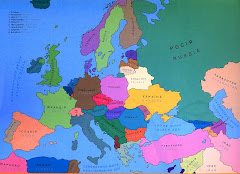.jpg) An Asperger Journey, Loren's book cover, front and back, designed by Elissa Alden Cary, and thanks to Christopher Watson, printed August 2010, 3 months after Loren's last hike along the Aucilla River basin with the Florida Trails Association. One member wrote in Loren's Memorial Book at the funeral home: "The woods will miss him." Yes, and we all miss him.
An Asperger Journey, Loren's book cover, front and back, designed by Elissa Alden Cary, and thanks to Christopher Watson, printed August 2010, 3 months after Loren's last hike along the Aucilla River basin with the Florida Trails Association. One member wrote in Loren's Memorial Book at the funeral home: "The woods will miss him." Yes, and we all miss him.Hubert Humphrey (Wikipedia photo, right) was Loren's No. 1 political hero and guru. Loren followed his career closely, before most Americans had heard of him, starting in college at Culver-Stockton in Missouri, when he was a college liaison for the 1968 Humphrey presidential campaign. It was the beginning of his lifelong political activism. Loren believed Humphrey's loss and Richard Nixon's election was a major, and tragic, turning point in American history, a profound twist of fate that affected the next 50 years of our

political life. Loren claimed, until his last hike, that while politics had not been kind to Humphrey, history would be. He was sure of it.
Humphrey was ahead of his times, far ahead. One of the first city Mayors to get passage of a fair employment civil rights bill, the first to introduce legislation creating the Peace Corps (which most of us attribute to JFK, but how we forget!), and the first to stand up at a Democratic convention and, in a stirring and iconic speech, urge passage of a Civ
Humphrey was ahead of his times, far ahead. One of the first city Mayors to get passage of a fair employment civil rights bill, the first to introduce legislation creating the Peace Corps (which most of us attribute to JFK, but how we forget!), and the first to stand up at a Democratic convention and, in a stirring and iconic speech, urge passage of a Civ
il Rights plank. That was 1948, way before the resurgence of a national civil rights movement, before MLK, before JFK and Lyndon Johnson, before any other national leader.
Loren knew that 1948 speech by heart. "To those who say we are rushing the issue, I say we are 172 years too late...the time has come for the Democratic party to come out of the shadow of States Rights and walk forthright into the bright sunshine of human rights.”
The plank was adopted, but the Democratic party split. Southern Democrats were enraged at this affront to their "way of life,” left the party and formed the Dixiecrat party, nominating StromThurmond of South Carolinga as its presidential candidate. “A sorry replay of the secession movement in that state that triggered the outbreak of Civil War,” Loren would say. “Pitiful. Outrageous.” Harry Truman won anyways in a super close race, an astonishing victory that demonstrated for some people that the Democrats could win elections without the "solid South."
As Senator from Minnesota from 1948 to 1964, when he ran for Vice President with LBJ, Humphrey remained ahead of his time. He supported a strong civil rights law in opposition to racial segregation, called for federal legislation against lynching, an end to school segregation, and an end to discrimination based on race. He was called "The Happy Warrior" for his cheerful demeanor and his forceful advocacy of progressive causes. Loren understood this.
Loren always regretted the results of the 1968 election. He knew I had supported George McGovern and he always took me to task for it. America would have been a different place if Humphrey had won, Loren maintained, a far saner, more peaceful, more equalitarian and just society. Loren was often a “Cassandra,” speaking truth that no one heard or paid attention to.
As Senator from Minnesota from 1948 to 1964, when he ran for Vice President with LBJ, Humphrey remained ahead of his time. He supported a strong civil rights law in opposition to racial segregation, called for federal legislation against lynching, an end to school segregation, and an end to discrimination based on race. He was called "The Happy Warrior" for his cheerful demeanor and his forceful advocacy of progressive causes. Loren understood this.
Loren always regretted the results of the 1968 election. He knew I had supported George McGovern and he always took me to task for it. America would have been a different place if Humphrey had won, Loren maintained, a far saner, more peaceful, more equalitarian and just society. Loren was often a “Cassandra,” speaking truth that no one heard or paid attention to.
In An Aspergrer Journey, Loren says the most significant part of being in Washington, DC in 1977, soon after our father died, was being able to attend Hubert Humphrey’s funeral in January. He recalls walking from Foggy Bottom, across the mall, up Pennsylvania Avenue to the U.S. Congress, “sick as a dog,” to join a long line of people paying their respects to this political hero. Loren was first among them.
Soon after, Loren left DC and went back to Rochester, NY, facing another life transition, but still, always, committed to the principles of Hubert Humphrey. It would lead him into the VISTA volunteer program on a continuing quest for “participatory democracy,” peace and justice. Loren never faltered in his beliefs. Loren and Hubert Humphrey, happy warriors.




























No comments:
Post a Comment